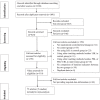Problem-based or lecture-based learning, old topic in the new field: a meta-analysis on the effects of PBL teaching method in Chinese standardized residency training
- PMID: 35361207
- PMCID: PMC8974027
- DOI: 10.1186/s12909-022-03254-5
Problem-based or lecture-based learning, old topic in the new field: a meta-analysis on the effects of PBL teaching method in Chinese standardized residency training
Abstract
Background: Standardized residency training (SRT) is crucial for graduate medical education and the training of high-quality doctors. Nevertheless, China started SRT nationwide only in the recent decade. During these years, researchers have been searching for suitable teaching methods to improve the abilities of residents. Although the problem-based learning (PBL) teaching mode has been applied in undergraduate teaching for many years, the teaching effect of PBL has not been unified in Chinese SRT according to the core competences of the residents.
Methods: Studies that compared the teaching effect of PBL and lecture-based learning (LBL) on SRT in China from January 2010 to April 2020 in the Chinese databases, such as China National Knowledge Infrastructure (CNKI), WanFang, WeiPu, Chinese BioMedical Literature (CBM), and English-language online databases, such as PubMed, Embase, and Cochrane Library were systematically reviewed. Data were analyzed using the Stata version 12.0 software.
Results: A total of 75 articles (76 studies) were included in this meta-analysis. Compared with LBL group, PBL-based methods are more effective in the mastery of medical theory knowledge (WMD = 7.14, 95% CI: 5.93-8.34), operational skills (WMD = 6.54, 95% CI: 4.55-8.53), analysis and diagnosis of cases (WMD = 8.52, 95% CI: 7.50-9.53), and overall capacity (WMD = 8.70, 95% CI: 6.87-10.53), but showed no advantage on operational skills in diagnostic imaging (WMD = 1.30, 95% CI: -0.11-2.71). The questionnaire surveys analyzed in this meta-analysis indicated the positive effects of PBL on the mastery of theoretical knowledge, clinical diagnostic thinking, teamwork ability, ability to analyze and solve problems, ability to consult documents, learning interest and learning efficiency, but that there were no advantages in improving self-directed learning ability, communication ability and hands-on ability. The questionnaire result analyzed in this meta-analysis also showed the residents' satisfaction with PBL-based strategies.
Conclusions: Taken together, the current meta-analysis provides a systematic and comprehensive analysis on PBL teaching mode in Chinese SRT and outlines a path for further research on the detailed design of suitable teaching methods for different specialties and abilities.
Keywords: Standardized residency training; lecture-based learning; meta-analysis; problem-based learning.
© 2022. The Author(s).
Conflict of interest statement
The authors declare that they have no competing interests.
Figures







Similar articles
-
Effectiveness of multiple teaching methods in standardized training of internal medicine residents in China: a network meta-analysis.BMC Med Educ. 2025 Apr 15;25(1):535. doi: 10.1186/s12909-025-07020-1. BMC Med Educ. 2025. PMID: 40234869 Free PMC article.
-
Combined administration of problem- and lecture-based learning teaching models in medical education in China: A meta-analysis of randomized controlled trials.Medicine (Baltimore). 2018 Oct;97(43):e11366. doi: 10.1097/MD.0000000000011366. Medicine (Baltimore). 2018. PMID: 30412058 Free PMC article. Review.
-
Comparing hybrid problem-based and lecture learning (PBL + LBL) with LBL pedagogy on clinical curriculum learning for medical students in China: a meta-analysis of randomized controlled trials.Medicine (Baltimore). 2020 Apr;99(16):e19687. doi: 10.1097/MD.0000000000019687. Medicine (Baltimore). 2020. PMID: 32311943 Free PMC article.
-
Impacts of blended learning with BOPPPS model on Chinese medical undergraduate students: a comprehensive systematic review and meta-analysis of 44 studies.BMC Med Educ. 2024 Aug 23;24(1):914. doi: 10.1186/s12909-024-05917-x. BMC Med Educ. 2024. PMID: 39180016 Free PMC article.
-
The effect of problem-based learning on improving problem-solving, self-directed learning, and critical thinking ability for the pharmacy students: A randomized controlled trial and meta-analysis.PLoS One. 2024 Dec 2;19(12):e0314017. doi: 10.1371/journal.pone.0314017. eCollection 2024. PLoS One. 2024. PMID: 39621602 Free PMC article. Clinical Trial.
Cited by
-
Effectiveness of multiple teaching methods in standardized training of internal medicine residents in China: a network meta-analysis.BMC Med Educ. 2025 Apr 15;25(1):535. doi: 10.1186/s12909-025-07020-1. BMC Med Educ. 2025. PMID: 40234869 Free PMC article.
-
Effect of the BOPPPS model combined with case-based learning versus lecture-based learning on ophthalmology education for five-year paediatric undergraduates in Southwest China.BMC Med Educ. 2022 Jun 7;22(1):437. doi: 10.1186/s12909-022-03514-4. BMC Med Educ. 2022. PMID: 35668389 Free PMC article.
-
Learning needs of residents in oral and maxillofacial surgery outpatient clinics: a dual-source survey study.BMC Med Educ. 2025 Mar 18;25(1):392. doi: 10.1186/s12909-025-06980-8. BMC Med Educ. 2025. PMID: 40102839 Free PMC article.
-
Comparison of flipped classroom and lecture-based models in a radiology residency training program.BMC Med Educ. 2025 Jul 20;25(1):1089. doi: 10.1186/s12909-025-07702-w. BMC Med Educ. 2025. PMID: 40685372 Free PMC article.
-
Learning: New Strategy for Humanized Digital Medical Education and Training in Cardiology.Arq Bras Cardiol. 2022 Oct;119(5 suppl 1):35-42. doi: 10.36660/abc.20220423. Arq Bras Cardiol. 2022. PMID: 36449957 Free PMC article. English, Portuguese.
References
-
- Hou JL, Michaud C, Li ZH, Dong Z, Sun BZ, Zhang JH, Cao D, Wan XH, Zeng C, Wei B, Tao LJ, Li XS, Wang WM, Lu YQ, Xia XL, Guo GF, Zhang ZY, Cao YF, Guan YZ, Meng QY, Wang Q, Zhao YH, Liu HP, Lin HQ, Ke Y, Chen L. Transformation of the education of health professionals in China: progress and challenges. Lancet. 2014;384(9945):819–827. doi: 10.1016/S0140-6736(14)61307-6. - DOI - PubMed
Publication types
MeSH terms
Grants and funding
LinkOut - more resources
Full Text Sources
Miscellaneous

